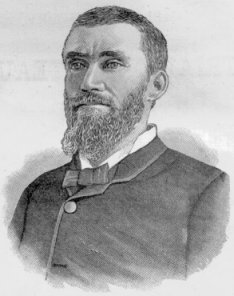Charles J. Guiteau
|
|
Charles Julius Guiteau (September 8, 1841 – June 30, 1882) was an American lawyer with a history of mental illness who assassinated President James Garfield on July 2, 1881 (although he did not die until September 19).
Born in Freeport, Illinois, Guiteau was routinely beaten by his father as a child and left home at an early age. He inherited $1000 from his grandfather as a young man and went to law school, where he promptly flunked out. Undeterred he used his money to start a law firm in Chicago based on ludicrously fraudulent recommendations from virtually every prominent American family he could think of. After every case he handled resulted in enraged clients and judicial criticism, he went wandering and ended up at the controversial Oneida Community, where he joined an obscure religious sect, and reportedly spent all his time in sexual abandon. He was eventually expelled from the community for his all too obvious mental irregularities and then devoted himself to theology.
He published a book on the subject called The Truth which was almost entirely plagiarism of the words of others. After that embarrassment, Guiteau took an interest in politics. He repeatedly gave rambling unsolicited campaign speeches on Garfield's behalf during the election months, and believed himself to be solely responsible for Garfield's victory. He insisted on being awarded an ambassadorship for his vital assistance (he ultimately hoped for a position as a diplomat in Paris), and when he was ignored by the White House he went into seclusion and prayer, and believed that God had commanded him to kill the president. Guiteau bought an expensive .44 caliber collector's revolver which was ornately engraved with precious metals, because he wanted it to look good as a museum exhibit after the assassination. He shot Garfield in the back as he was boarding a train in Washington, DC.
It took Garfield several weeks of lingering health to finally die from his bullet wound on September 19, during which time all manner of experimental medical procedures were employed in vain to save him, including arguably the world's first metal detector invented by Alexander Graham Bell, which failed to locate the bullet due to the metal springs in the mattress of the bed that the president was resting on. Most likely Garfield died from infection on account of doctors constantly handling his open wound without any sterilization, and conceivably would have survived if he had just been allowed to rest and recover on his own.
Guiteau became something of a media darling during his trial for his bizarre behavior, including constantly badmouthing his defense team, formatting his testimony in epic poems which he recited at length, and soliciting legal advice from random spectators in the audience via passed notes. At one point, he argued that Garfield was killed not by himself but by medical malpractice, which was more than a little true. To the end Guiteau was actively making plans to start a lecture tour after his perceived imminent release. He was dismayed when the jury was unconvinced of his divine inspiration, and he was convicted of the murder. He was found guilty on January 23, 1882 and was hanged on June 30, 1882 in the District of Columbia.
Guiteau's trial was one of the first high profile cases in the United States where the insanity defense was considered, although Guiteau vehemently denied he was insane, which was one of the major causes of the rift between him and his defense lawyers.
In the musical play Assassins by Stephen Sondheim and John Weidman, 'Charlie' Guiteau is portrayed as a comical buffoon who sings a cakewalk, "I Am Going to the Lordy!" as he ascends the scaffold to be executed. Some of the lyrics to the Ballad of Guiteau were written by Guiteau himself, including the statement of "Going to the Lordy!" Sondheim fleshed out Guiteau's own song and added music to it. The assassination is also mentioned in the Johnny Cash tune, "Mister Garfield (Has Been Shot Down)", released in 1965 by Columbia Records.
The life of Guiteau has many parallels as that of Garfield, the examination of which forms the primary narrative device of Rick Geary's comic book The Fatal Bullet: a true account of the assassination, lingering pain, death, and burial of James A. Garfield, twentieth president of the United States; also including the inglorious life and career of the despised assassin Guiteau (1999, Nantier, Beall, Minoustchine), a volume in his series, A Treasury of Victorian Murder.

